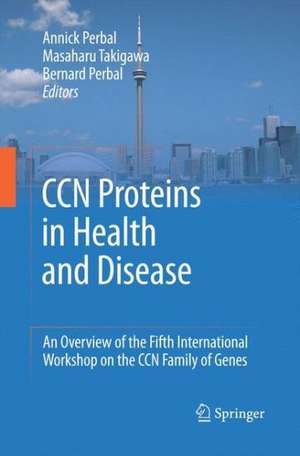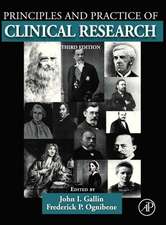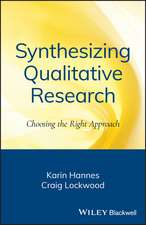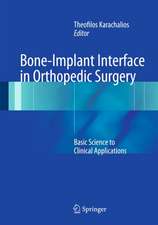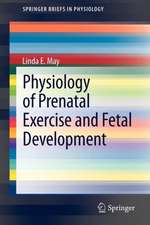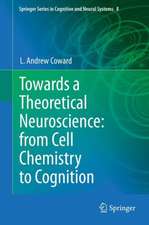CCN proteins in health and disease: An overview of the Fifth International Workshop on the CCN family of genes
Editat de Annick Perbal, Masaharu Takigawa, Bernard Perbalen Limba Engleză Paperback – 30 noi 2014
The current view is that CCN proteins modulate signaling pathways that involve regulatory components of the extracellular matrix. As such, they likely act as a central hub in the regulation of mitosis, adhesion, apoptosis, extracellular matrix production, growth arrest and migration of multiple cell types.
The 5th international workshop on the CCN family of genes, that was held in Toronto in 2008 brought together scientists from around the world who have an interest in the biological roles of this emerging family of proteins. On an educational point of view, the workshop was a unique place for an efficient diffusion of scientific information.
The present book comprises a series of selected manuscripts that are based on the original communications that were presented at the meeting by worldwide leaders in the field of CCN biology.
All major aspects of CCN proteins biology in both normal and pathological conditions are covered in this volume, from structure-functions analysis up to the involvement of CCN proteins in complex physiological functions.
In addition to reports that support the Yin-Yang concept of CCN proteins driving opposite effects on the same biological process, this book also comprises several contributions that point to CCN proteins as amenable targets for therapeutic manipulation of disease processes.
Together with the special issue of Journal of Cell Communication and Signaling in which authors have extended on the original data presented at the meeting, the present Proceedings provide an instant picture and unique update of the state of the art in the CCN field.
| Toate formatele și edițiile | Preț | Express |
|---|---|---|
| Paperback (1) | 1097.54 lei 43-57 zile | |
| SPRINGER NETHERLANDS – 30 noi 2014 | 1097.54 lei 43-57 zile | |
| Hardback (1) | 1102.10 lei 43-57 zile | |
| SPRINGER NETHERLANDS – 6 mai 2010 | 1102.10 lei 43-57 zile |
Preț: 1097.54 lei
Preț vechi: 1155.30 lei
-5% Nou
Puncte Express: 1646
Preț estimativ în valută:
210.04€ • 218.48$ • 173.40£
210.04€ • 218.48$ • 173.40£
Carte tipărită la comandă
Livrare economică 14-28 aprilie
Preluare comenzi: 021 569.72.76
Specificații
ISBN-13: 9789401782913
ISBN-10: 9401782911
Pagini: 356
Ilustrații: XIII, 338 p.
Dimensiuni: 155 x 235 x 19 mm
Greutate: 0.5 kg
Ediția:2010
Editura: SPRINGER NETHERLANDS
Colecția Springer
Locul publicării:Dordrecht, Netherlands
ISBN-10: 9401782911
Pagini: 356
Ilustrații: XIII, 338 p.
Dimensiuni: 155 x 235 x 19 mm
Greutate: 0.5 kg
Ediția:2010
Editura: SPRINGER NETHERLANDS
Colecția Springer
Locul publicării:Dordrecht, Netherlands
Public țintă
ResearchCuprins
A Recent Breakthrough in the CCN Field: Functional Interactions Between CCN2 and CCN3 are Uncovered.- Report on the Fifth International Workshop on the CCN Family of Genes.- Asking the Right Questions: What Can the Structure of the CCN Protein Domains Tell Us?.- Nucleophosmin/B23: A Multifunctional Regulator that Determines the Fate of CCN2 mRNA.- The CCN Genes as the “Master” Regulators of Angiogenesis, Vasculogenesis, Fibrogenesis and Cell Differentiation/Fate Specification in Mechanical Force-Driven Developmental Processes and Pathological Events.- A Monoclonal Antibody Approach to CCN5 Domain Analysis.- Matricellular Protein CCN2 Produced by Tubular Epithelial Cells Plays a Pivotal Role in Renal Fibrogenesis.- Cooperative Regulation of Cell Proliferation and Differentiation by CCN2 and CCN3.- The Role of CCN3 in Mesenchymal Stem Cells.- Role of Connective Tissue Growth Factor in Cardiac Fibrosis.- Gene Expression of CCN Family Members in Young and Aged Human Skin In Vivo.- Global Expression Profiling Reveals a Role for CTGF/CCN2 in Lactogenic Differentiation of Mouse Mammary Epithelial Cells.- CCN3 (NOV): A Negative Regulator of CCN2 (CTGF) Activity and an Endogenous Inhibitor of Fibrosis in Experimental Diabetic Nephropathy.- Inhibitors of Connective Tissue Growth Factor (CCN2)-Mediated Fibrogenesis: Underlying Mechanisms and Prospects for Anti-fibrotic Therapy.- CCN3 Promotes Melanoma Progression by Regulating Integrin Expression, Adhesion and Apoptosis Induced by Cytotoxic Drugs.- CCN3: A NOVel Growth Factor in Leukaemia.- Prognostic Relevance of CCN3 in Bone Sarcomas.- CCN6 Regulates Breast Cancer Growth and Invasion Through Modulation of IGF Signaling and Epithelial to Mesenchymal Transition.- Novel Transcriptional Regulation of CCN2/CTGF by NuclearTranslocation of MMP3.
Textul de pe ultima copertă
The CCN family of genes currently comprises six secreted proteins (designated CCN16 i.e., Cyr61/CCN1; ctgf/CCN2; Nov/CCN3; WISP1/CCN4; WISP2/CCN5, and WISP3/CCN6) showing a strikingly conserved primary structure, with four modules sharing partial identity with IGF binding proteins, Von Willebrand protein, thrombospondin and several matricellular proteins and growth factors.
The current view is that CCN proteins modulate signaling pathways that involve regulatory components of the extracellular matrix. As such, they likely act as a central hub in the regulation of mitosis, adhesion, apoptosis, extracellular matrix production, growth arrest and migration of multiple cell types.
The 5th international workshop on the CCN family of genes, that was held in Toronto in 2008 brought together scientists from around the world who have an interest in the biological roles of this emerging family of proteins. On an educational point of view, the workshop was a unique place for an efficient diffusion of scientific information.
The present book comprises a series of selected manuscripts that are based on the original communications that were presented at the meeting by worldwide leaders in the field of CCN biology.
All major aspects of CCN proteins biology in both normal and pathological conditions are covered in this volume, from structure-functions analysis up to the involvement of CCN proteins in complex physiological functions.
In addition to reports that support the Yin-Yang concept of CCN proteins driving opposite effects on the same biological process, this book also comprises several contributions that point to CCN proteins as amenable targets for therapeutic manipulation of disease processes.
Together with the special issue of Journal of Cell Communication and Signaling in which authors have extended on the original data presented at the meeting, the present Proceedings provide an instant picture and unique update of the state of the art in the CCN field.
The current view is that CCN proteins modulate signaling pathways that involve regulatory components of the extracellular matrix. As such, they likely act as a central hub in the regulation of mitosis, adhesion, apoptosis, extracellular matrix production, growth arrest and migration of multiple cell types.
The 5th international workshop on the CCN family of genes, that was held in Toronto in 2008 brought together scientists from around the world who have an interest in the biological roles of this emerging family of proteins. On an educational point of view, the workshop was a unique place for an efficient diffusion of scientific information.
The present book comprises a series of selected manuscripts that are based on the original communications that were presented at the meeting by worldwide leaders in the field of CCN biology.
All major aspects of CCN proteins biology in both normal and pathological conditions are covered in this volume, from structure-functions analysis up to the involvement of CCN proteins in complex physiological functions.
In addition to reports that support the Yin-Yang concept of CCN proteins driving opposite effects on the same biological process, this book also comprises several contributions that point to CCN proteins as amenable targets for therapeutic manipulation of disease processes.
Together with the special issue of Journal of Cell Communication and Signaling in which authors have extended on the original data presented at the meeting, the present Proceedings provide an instant picture and unique update of the state of the art in the CCN field.
Caracteristici
Unique book volume on the 2008 CCN SOciety Conference
